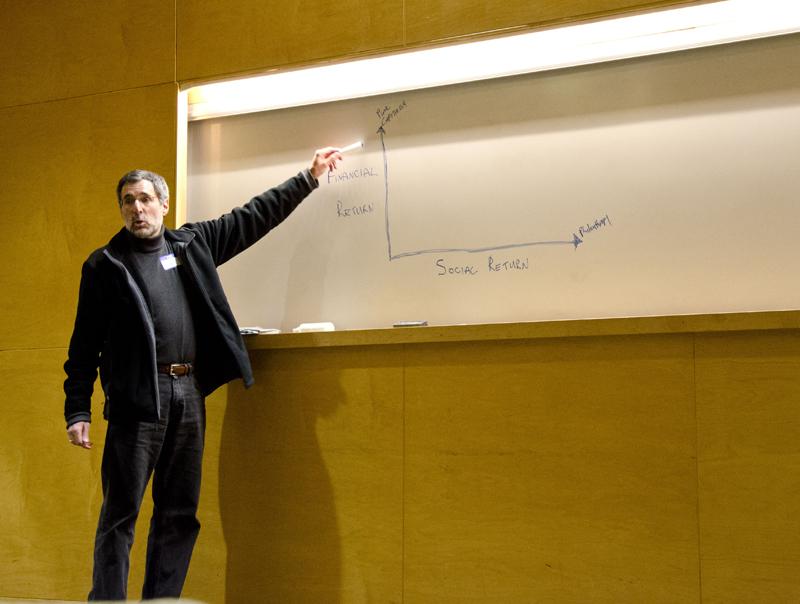RIO Investment Symposium Assesses Community Standards
Joel Steiker, OC ’78, speaks at the Responsible Investment Organization’s symposium about respon- sible investment techniques. Steiker is a fund manager at Murex Investments.
March 14, 2014
Students, faculty and community members congregated in the Adam Joseph Lewis Center this weekend, foregoing the sunshine to attend the Responsible Investment Policy symposium. The symposium, which was an effort to gather community views and concerns on responsible investing, was held with the goal to apply these ideas to Oberlin College’s endowment fund.
“The stated goal, and certainly how we’ve been approaching it, is to gauge what the inclusive Oberlin community would define responsible investing as,” said Andrew Follman, Responsible Investing Organization member and symposium logistics point person.
Over the two-day symposium, RIO brought in four speakers and, in collaboration with other student organizations, facilitated discussions in a variety of working groups. The working groups, ranging in topic from environmental ism to labor to the prison system, were at the heart of RIO’s efforts to gather a range of voices and opinions on responsible investment.
“I’m a former city councilman … so I definitely have an interest in how the community operates, how it grows and how it prospers, and [I] have a number of good ideas I feel that I could impart upon them, and this provided the opportunity, so I’ve taken advantage of it,” said Tony Mealy, a former Oberlin city councilman who attended the symposium.
RIO plans to create a committee that will synthesize notes from the working groups. Using these ideas, the committee will organize a policy for the investment of RIO’s $50,000 Social Choice Scholarship.
RIO hopes to eventually convince the College to invest five percent of its $700 millionplus endowment fund. One percent of this will go towards local impact investments, or investments that have low profitability but high social value. Administrative response to this call has been mixed.
“[Speaking to the administration] doesn’t usually result in much,” said RIO member and College first-year Ema Sagner. “I think that individual members of the administration want to support student groups, but I think that it gets more complicated when you talk about the administration as a whole … Certainly in some ways they’ve been mildly supportive of us.”
RIO’s recent exclusion from the College-sponsored Oberlin Symposium on Divestment has been a point of contention. Members from RIO spoke to the administration last November about the Divestment Symposium and expressed their interest in working together on the event. However, just days before the symposium, RIO was informed they would not be involved.
Ron Watts, vice president for finance, spoke at the symposium, where both College President Marvin Krislov and Dean of Studies Eric Estes were in attendance.
“RIO did a lot of work in order to hold the symposium and invited me to attend. I understand RIO is working on more specific proposals related to responsible investing, so I’m doing a lot of listening right now,” Estes wrote in a letter to the Review.
RIO has also been striving to build student and community awareness of responsible investment.
“At the beginning of last year, this group was founded and nobody on campus knew the word ‘responsible investing.’ Through the whole of last year, and certainly through this, I’d say 80 [or] 85 percent [of the student population] at least knows generally what responsible investing means. I couldn’t tell you like a percentage [of people] who are super, super supportive of it,” Follman said.
To increase interest and gather opinions, RIO reached out to both student groups and the larger community. Groups such as Slow Food Oberlin, Oberlin J Street U, Oberlin Students for a Free Palestine, the Multicultural Resource Center, OSCA, Oberlin Community Services and the Oberlin Underground Railroad Society were invited to attend the RIO Symposium.
Izzy Esler, a College junior and member of Student Labor Action Coalition, helped facilitate the labor working group at the event. “I think it’s important especially at Oberlin … [to] think about incorporating the College with the community,” she said. “I think it would be cool if SLAC and RIO were working together. I think it’s good when … [we] get student groups working together.”
Some, however, felt the representation at the symposium was limited. One of the speakers, Tanya Fields, mentioned the lack of students of color in the audience. Isabella Moreno, OC ’94, and assistant director of the Office of Disability Services, echoed this concern and felt that more could have been done to communicate with Afrikan Heritage House and Third World Co-op.
“I think [it] was phenomenal … that Oberlin College, via RIO, brought Tanya Fields,” Moreno said. “I also think that we need to really look at who’s involved with the conversation, who’s at the table, who are the stakeholders and who are we inviting to be stakeholders. The Responsible Investment has to do with environmental studies, but how do people of color fit into that conversation … Environmental activists are paramount because they’re the ones dealing with the multitude of toxins figuratively and literally, so there wasn’t necessarily a connection between these communities on campus and the symposium.”
RIO is now putting together a committee to create a responsible investment plan for the Social Choice Scholarship fund using the information gathered during the symposium.





















